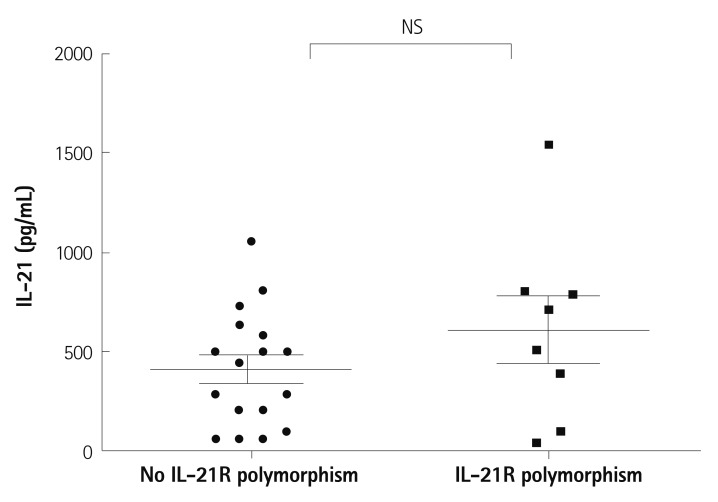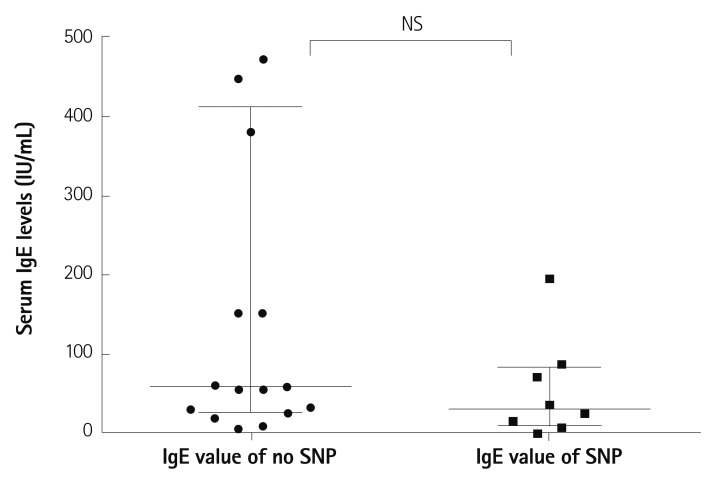Korean Circ J.
2013 Jan;43(1):38-43. 10.4070/kcj.2013.43.1.38.
Interleukin-21 Receptor Gene Polymorphisms in Kawasaki Disease
- Affiliations
-
- 1Department of Pediatrics, Yonsei University Wonju College of Medicine, Wonju, Korea. reehy@yonsei.ac.kr
- 2Division of Biological Science and Technology & Yonsei-Frauhofer Medical Device Lab, College of Science and Technology, Yonsei University, Wonju, Korea.
- 3Department of Preventive Medicine, Yonsei University Wonju College of Medicine, Wonju, Korea.
- KMID: 1722999
- DOI: http://doi.org/10.4070/kcj.2013.43.1.38
Abstract
- BACKGROUND AND OBJECTIVES
Interleukin-21 receptor (IL-21R) gene polymorphism is related with the development of systemic vasculitis. In this study, we investigated the polymorphisms of IL-21R gene in patients with Kawasaki disease (KD).
SUBJECTS AND METHODS
We genotyped the promoter region of IL-21R gene (-2500 bp to +1 bp) in 100 patients with KD and 100 healthy controls. All study subjects were Korean. We designed five pairs of primers and performed polymerase chain reaction (PCR) and direct sequencing. We analyzed whole promoter sequences of 200 individuals with comparison to reference sequences of IL-21R gene (NG_012222.1/NC_000016.9).
RESULTS
We found five single nucleotide polymorphisms (SNPs) of which minor allele frequency (MAF) >0.01 in the promoter region of IL-21R gene. Those are -1681 G>T (chromosome site 27411802), -379 G>A (27413104), -332 G>C (27413151, rs2214537), -237 A>T (27413246), and -53 G>A (27413430). There is no significant difference in MAF of each SNP between patients with KD and healthy controls except -237 A>T. Twenty five patients with KD had more than 1 SNP in contrast to only seven healthy controls had. The patients with KD have significantly more IL-21R gene polymorphisms than controls (odds ratio: 3.0, 95% confidence interval: 1.6-5.6, p=0.0005). There was no significant correlation between IL-21R gene polymorphisms and the serum level of IL-21. The serum level of total IgE was not significantly correlated with the presence of IL-21R gene polymorphisms.
CONCLUSION
Our data suggest that the genetic susceptibility profile for KD may include IL-21R gene.
MeSH Terms
-
Gene Frequency
Genetic Predisposition to Disease
Humans
Immunoglobulin E
Interleukins
Mucocutaneous Lymph Node Syndrome
Polymerase Chain Reaction
Polymorphism, Genetic
Polymorphism, Single Nucleotide
Promoter Regions, Genetic
Receptors, Interleukin-21
Systemic Vasculitis
Immunoglobulin E
Interleukins
Receptors, Interleukin-21
Figure
Reference
-
1. Kawasaki T. [Acute febrile mucocutaneous syndrome with lymphoid involvement with specific desquamation of the fingers and toes in children]. Arerugi. 1967; 16:178–222. PMID: 6062087.2. Onouchi Y. Molecular genetics of Kawasaki disease. Pediatr Res. 2009; 65:46R–54R.3. Burns JC, Glodé MP. Kawasaki syndrome. Lancet. 2004; 364:533–544. PMID: 15302199.4. Cheung YF, Huang GY, Chen SB, et al. Inflammatory gene polymorphisms and susceptibility to kawasaki disease and its arterial sequelae. Pediatrics. 2008; 122:e608–e614. PMID: 18710885.5. Yeung RS. Kawasaki disease: update on pathogenesis. Curr Opin Rheumatol. 2010; 22:551–560. PMID: 20616737.6. Sohn MH, Hur MW, Kim DS. Interleukin 6 gene promoter polymorphism is not associated with Kawasaki disease. Genes Immun. 2001; 2:357–362. PMID: 11704800.7. Ahn HM, Park IS, Hong SJ, Hong YM. Interleukin-6 (-636 c/g) gene polymorphism in Korean children with Kawasaki disease. Korean Circ J. 2011; 41:321–326. PMID: 21779285.8. Quasney MW, Bronstein DE, Cantor RM, et al. Increased frequency of alleles associated with elevated tumor necrosis factor-alpha levels in children with Kawasaki disease. Pediatr Res. 2001; 49:686–690. PMID: 11328953.9. Huang FY, Chang TY, Chen MR, et al. Genetic polymorphisms in the CD40 ligand gene and Kawasaki disease. J Clin Immunol. 2008; 28:405–410. PMID: 18481160.10. Breunis WB, Biezeveld MH, Geissler J, et al. Polymorphisms in chemokine receptor genes and susceptibility to Kawasaki disease. Clin Exp Immunol. 2007; 150:83–90. PMID: 17672867.11. Chun JK, Kang DW, Yoo BW, Shin JS, Kim DS. Programmed death-1 (PD-1) gene polymorphisms lodged in the genetic predispositions of Kawasaki Disease. Eur J Pediatr. 2010; 169:181–185. PMID: 19468750.12. Furuno K, Yuge T, Kusuhara K, et al. CD25+CD4+ regulatory T cells in patients with Kawasaki disease. J Pediatr. 2004; 145:385–390. PMID: 15343196.13. Sohn SY, Song YW, Yeo YK, et al. Alteration of CD4CD25Foxp3 T cell level in Kawasaki disease. Korean J Pediatr. 2011; 54:157–162. PMID: 21738549.14. Franco A, Shimizu C, Tremoulet AH, Burns JC. Memory T-cells and characterization of peripheral T-cell clones in acute Kawasaki disease. Autoimmunity. 2010; 43:317–324. PMID: 20166878.15. Gómez-Martín D, Díaz-Zamudio M, Romo-Tena J, Ibarra-Sánchez MJ, Alcocer-Varela J. Follicular helper T cells poise immune responses to the development of autoimmune pathology. Autoimmun Rev. 2011; 10:325–330. PMID: 21167320.16. King C, Ilic A, Koelsch K, Sarvetnick N. Homeostatic expansion of T cells during immune insufficiency generates autoimmunity. Cell. 2004; 117:265–277. PMID: 15084263.17. Jin H, Carrio R, Yu A, Malek TR. Distinct activation signals determine whether IL-21 induces B cell costimulation, growth arrest, or Bim-dependent apoptosis. J Immunol. 2004; 173:657–665. PMID: 15210829.18. Lee HK, Kim DS, Noh GW, Lee KY. Effects of intravenous immune globulin on the peripheral lymphocyte phenotypes in Kawasaki disease. Yonsei Med J. 1996; 37:357–363. PMID: 8997168.19. Ozaki K, Kikly K, Michalovich D, Young PR, Leonard WJ. Cloning of a type I cytokine receptor most related to the IL-2 receptor beta chain. Proc Natl Acad Sci U S A. 2000; 97:11439–11444. PMID: 11016959.20. Bae YJ, Kim MH, Lee HY, et al. Elevated Serum Levels of IL-21 in Kawasaki Disease. Allergy Asthma Immunol Res. 2012; 4:351–356. PMID: 23115732.21. Newburger JW, Takahashi M, Gerber MA, et al. Diagnosis, treatment, and long-term management of Kawasaki disease: a statement for health professionals from the Committee on Rheumatic Fever, Endocarditis and Kawasaki Disease, Council on Cardiovascular Disease in the Young, American Heart Association. Circulation. 2004; 110:2747–2771. PMID: 15505111.22. Pène J, Guglielmi L, Gauchat JF, et al. IFN-gamma-mediated inhibition of human IgE synthesis by IL-21 is associated with a polymorphism in the IL-21R gene. J Immunol. 2006; 177:5006–5013. PMID: 17015683.23. Caprioli F, Sarra M, Caruso R, et al. Autocrine regulation of IL-21 production in human T lymphocytes. J Immunol. 2008; 180:1800–1807. PMID: 18209077.24. Cannons JL, Qi H, Lu KT, et al. Optimal germinal center responses require a multistage T cell:B cell adhesion process involving integrins, SLAM-associated protein, and CD84. Immunity. 2010; 32:253–265. PMID: 20153220.25. Bennett F, Luxenberg D, Ling V, et al. Program death-1 engagement upon TCR activation has distinct effects on costimulation and cytokine-driven proliferation: attenuation of ICOS, IL-4, and IL-21, but not CD28, IL-7, and IL-15 responses. J Immunol. 2003; 170:711–718. PMID: 12517932.26. Cui W, Liu Y, Weinstein JS, Craft J, Kaech SM. An interleukin-21-interleukin-10-STAT3 pathway is critical for functional maturation of memory CD8+ T cells. Immunity. 2011; 35:792–805. PMID: 22118527.27. Linterman MA, Vinuesa CG. Signals that influence T follicular helper cell differentiation and function. Semin Immunopathol. 2010; 32:183–196. PMID: 20107805.28. Nara H, Onoda T, Rahman M, et al. Regulation of interleukin-21 receptor expression and its signal transduction by WSB-2. Biochem Biophys Res Commun. 2010; 392:171–177. PMID: 20059963.29. Hecker M, Bohnert A, König IR, Bein G, Hackstein H. Novel genetic variation of human interleukin-21 receptor is associated with elevated IgE levels in females. Genes Immun. 2003; 4:228–233. PMID: 12700598.30. Bucher C, Koch L, Vogtenhuber C, et al. IL-21 blockade reduces graft-versus-host disease mortality by supporting inducible T regulatory cell generation. Blood. 2009; 114:5375–5384. PMID: 19843883.
- Full Text Links
- Actions
-
Cited
- CITED
-
- Close
- Share
- Similar articles
-
- The soluble interleukin 2 receptor levels in Kawasaki disease
- The interleukin-6 level in Kawasaki disease
- Relationship between spontaneous preterm birth and polymorphisms of Interleukin-1beta and Interleukin-1 receptor antagonist in Korean women
- Serum interleukin-6 in Kawasaki disease
- The relationship between catechol-O-methyltransferase gene polymorphism and coronary artery abnormality in Kawasaki disease




